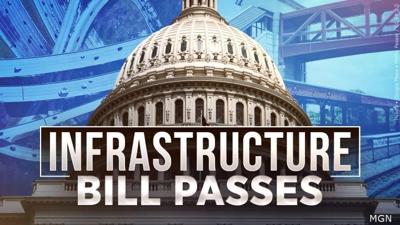(WSIL)---Congress has debated on it for months, but as of today, the US infrastructure bill is now law.
The $1.2 trillion investment marks a major victory for lawmakers from both parties.
So how does the infrastructure bill impact Illinois?
Roughly every 4 years, the American Society of Civil Engineers releases a report on US infrastructure.
The report tends to be more than 100 pages in length, and grades each state based on several categories of infrastructure.
That includes transportation and roadways or drinking water and dams.
Missouri, Kentucky, and Illinois all received a C- on their report cards.
To explain those grades a bit, a C- isn't all that bad.
The grade indicates our state infrastructure is in fair condition but requires attention.
Now that grade can get as low as an F, meaning the system is failing or in unacceptable condition.
And all the way up to an A, showing the infrastructure is sustainable and fit to meet growing capacity needs in the future.
Similar to an actual report card, your lowest grades can significantly reduce your overall GPA.
For Illinois, that was the state's roads, dams, waterways, and drinking water.
Many of the state's water systems were built in the first half of the 20th century.
The strain on the aging pipes is what causes our watermain breaks and leaks.
It's estimated Illinois loses as much as 30% of its water supply through these breaks.
It's also the reason Illinois received a C- in drinking water, and a C for its dams.
Of nearly 1800 dams in Illinois, more than 250 are considered high hazard.
But the worst grades for the state?
Those were in its roads and public transit, both receiving a D.
20% of Illinois roads are labeled as being in poor condition.
It's estimated drivers spend more than $600 per year due to driving on roads in need of repair.














